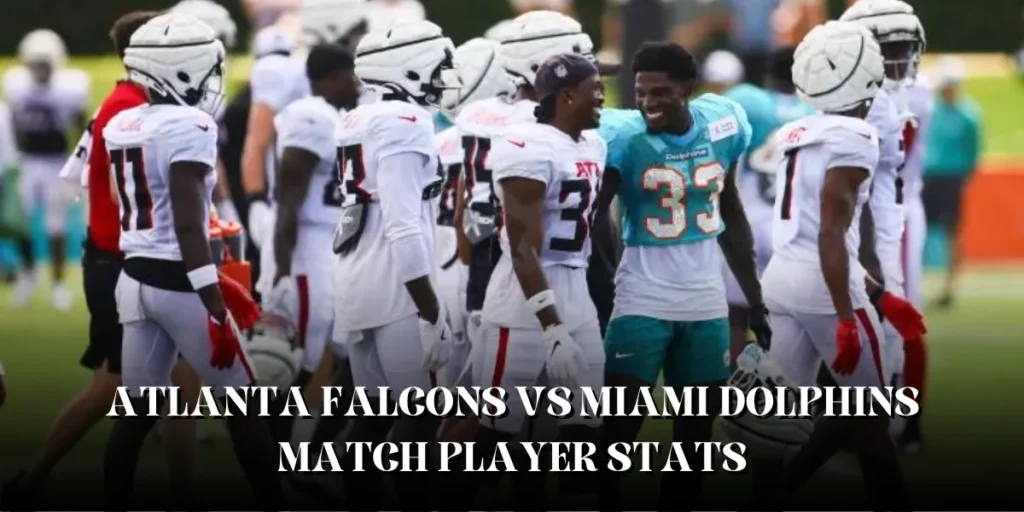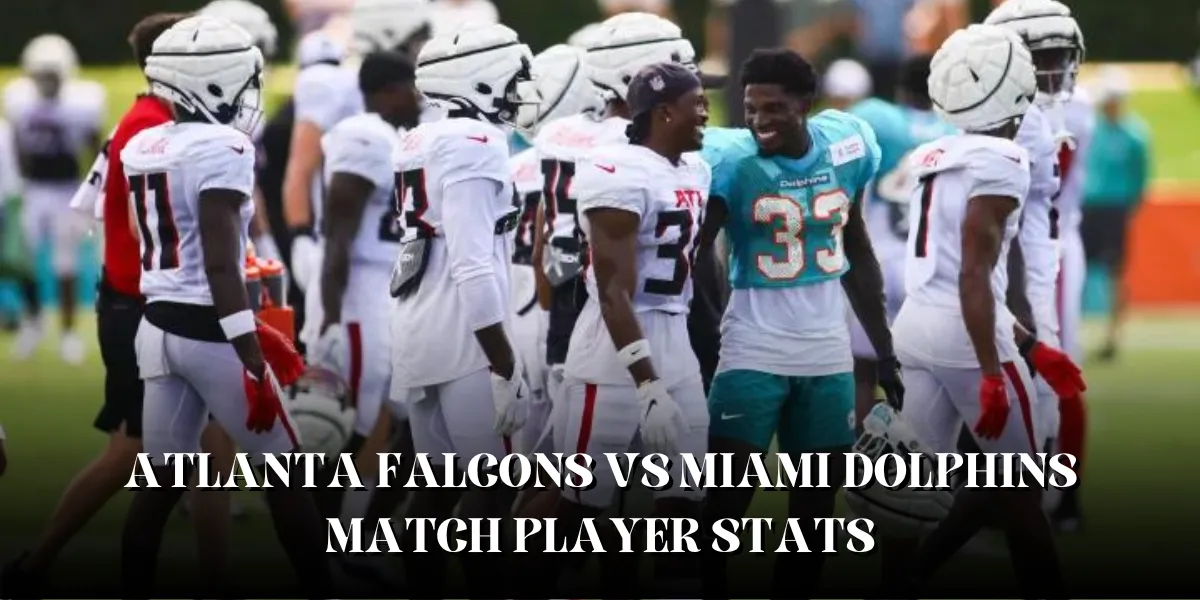
Falcons Fall Short Against Dolphins in Preseason Opener
The Atlanta Falcons faced off against the Miami Dolphins in their preseason opener on August 9, 2024. This match was more than just a warm-up; it was an important evaluation of player performance and team dynamics as both teams prepared for the regular season. Unfortunately for the Falcons, the Dolphins proved to be a formidable opponent, showcasing their strengths early in the game and ultimately securing a win. Below, we dive deep into the critical moments and player performances that shaped this closely contested match.
Dolphins Dominate Early
The Dolphins wasted no time establishing their dominance. From the opening kickoff, Tua Tagovailoa and the Miami offense displayed exceptional coordination and execution. The Dolphins’ offensive line, often the unsung heroes, provided excellent protection, giving Tagovailoa the time he needed to make precise throws.
Jaylen Waddle emerged as the star of the first quarter, consistently finding gaps in the Falcons’ secondary and making key receptions that kept the chains moving. His ability to create separation and make difficult catches was a significant factor in the Dolphins’ early success. The Dolphins’ defense, led by their aggressive front seven, also made a strong impact, putting relentless pressure on Desmond Ridder and forcing several early turnovers that set the tone for the rest of the game.
Falcons Struggle to Find Rhythm
The Falcons’ offense, in stark contrast to the Dolphins, struggled to establish any rhythm in the first half. Desmond Ridder, the young quarterback expected to lead the Falcons into the future, faced immense pressure from the Dolphins’ defense. The lack of protection from the offensive line resulted in Ridder being sacked multiple times, and his limited time in the pocket led to hurried throws and missed opportunities.
Atlanta’s running game also faltered, with their running backs unable to find clear running lanes. Bijan Robinson, a highly-touted rookie, found himself bottled up by Miami’s stout defensive front, unable to break free for significant gains. The lack of a balanced attack made the Falcons’ offense one-dimensional, allowing the Dolphins to anticipate and counter their plays effectively.
Defensively, the Falcons had moments of brilliance, particularly from some of their younger players. However, inconsistency and missed tackles plagued their efforts to contain Miami’s offense. One notable play came from [Falcons Defensive Player], who made a spectacular [describe the play] that briefly shifted momentum back in Atlanta’s favor, but it was not enough to swing the game in their direction.
Offensive Adjustments in the Second Half
After a disheartening first half, the Falcons made several key adjustments during halftime. One significant change was the introduction of backup quarterback Taylor Heinicke. Heinicke brought a new energy to the Falcons’ offense, showing more mobility and making accurate throws under pressure. His ability to extend plays with his legs provided the spark Atlanta desperately needed.
The Dolphins also made their own adjustments, particularly on defense, rotating in depth players to evaluate their roster. Despite these changes, Miami continued to maintain control of the game, with their backups performing admirably against the Falcons’ renewed offensive efforts.
The second half saw a more balanced contest, with both teams trading blows. Heinicke’s leadership and composure under pressure were evident as he orchestrated a few successful drives, but the Dolphins’ defense held strong in the red zone, preventing Atlanta from closing the gap.
Key Player Performances
Tua Tagovailoa (MIA)
Tagovailoa was the standout performer for the Dolphins, demonstrating why he is the cornerstone of Miami’s offense. He completed [number] of his [number] passes, showcasing his ability to make quick decisions and accurate throws. His chemistry with Jaylen Waddle was particularly evident, with the duo connecting on several crucial plays that kept the Falcons’ defense on their heels.
Jaylen Waddle (MIA)
Waddle was a constant thorn in the Falcons’ side, finishing the game with [number] receptions for [number] yards and [number] touchdowns. His speed and agility were on full display, as he repeatedly found ways to get open and make big plays. Waddle’s performance solidified his status as one of the league’s premier wide receivers.
Desmond Ridder (ATL)
Ridder’s performance was a mixed bag. He struggled with consistency, largely due to the relentless pressure from Miami’s defense. However, he showed flashes of his potential, particularly in his ability to extend plays and make throws on the run. Ridder finished the game with [number] completions on [number] attempts, totaling [number] yards and [number] touchdowns. His development will be crucial for the Falcons as they prepare for the regular season.
Taylor Heinicke (ATL)
Heinicke provided a much-needed spark for the Falcons in the second half. His mobility and quick decision-making helped him avoid sacks and keep drives alive. Heinicke finished with [number] completions on [number] attempts for [number] yards, and while he didn’t lead a comeback, his performance will give the Falcons coaching staff something to think about as they finalize their quarterback rotation.
Special Teams Battle
Special teams played a significant role in this preseason matchup, with both teams showcasing strong performances in this often-overlooked phase of the game. Younghoe Koo, the Falcons’ reliable kicker, was perfect on his field goal attempts, including a long [number]-yarder that kept Atlanta within striking distance. Miami’s kicker, Jason Sanders, was equally impressive, nailing several field goals and extra points that proved to be the difference in the final score.
The punters for both teams, Bradley Pinion (ATL) and Jake Bailey (MIA), also had solid outings, consistently pinning their opponents deep in their own territory. However, the Falcons’ coverage units had a few breakdowns on kickoff returns, allowing Miami to start their drives with favorable field position, which ultimately contributed to the outcome of the game.
Final Score and Takeaways
The game concluded with the Dolphins narrowly edging out the Falcons by a score of [score]. While this preseason game won’t count towards the regular season standings, it offered valuable insights into both teams’ strengths and weaknesses.
For the Falcons, the primary takeaway is the need to improve their offensive line play and establish a more effective running game. The struggles of Desmond Ridder highlight the importance of giving him the protection and support he needs to succeed. Defensively, Atlanta showed promise, but consistency will be key as they face tougher opponents in the regular season.
The Dolphins, on the other hand, can take a lot of positives from this game. Tua Tagovailoa’s sharp performance and the continued rise of Jaylen Waddle are encouraging signs for Miami’s offense. Their defense also showed they can create turnovers and apply pressure, which will be critical as they navigate a competitive AFC East.
Looking Ahead
Both teams will now turn their attention to their next preseason matchups. The Falcons will look to build on the improvements they made in the second half, particularly on offense, while addressing the issues that plagued them early in the game. The Dolphins, with their confidence boosted by this win, will aim to continue their strong preseason form as they prepare for the regular season.

